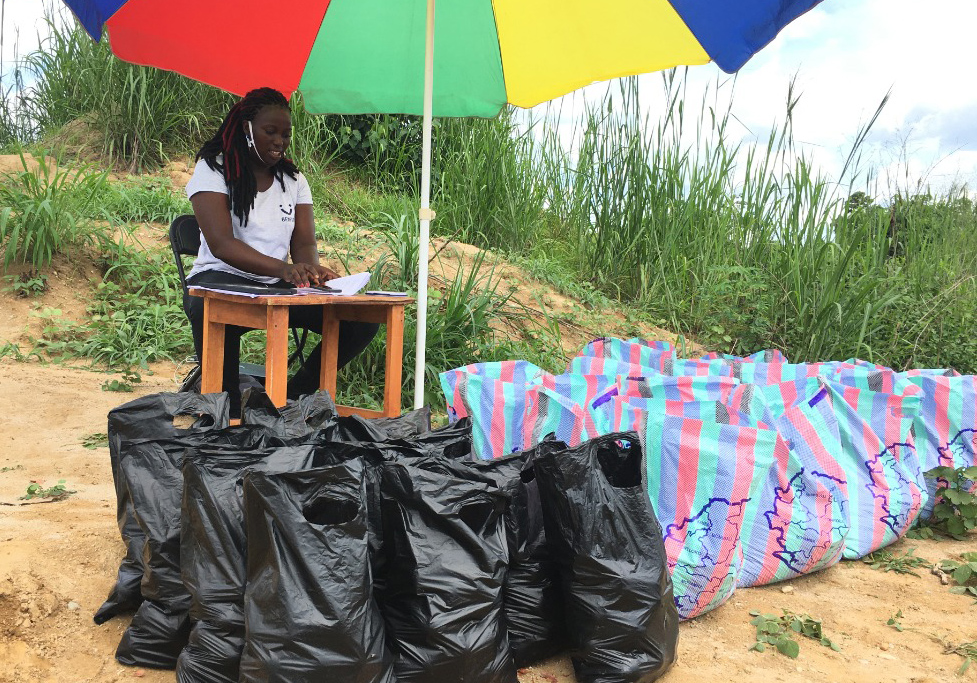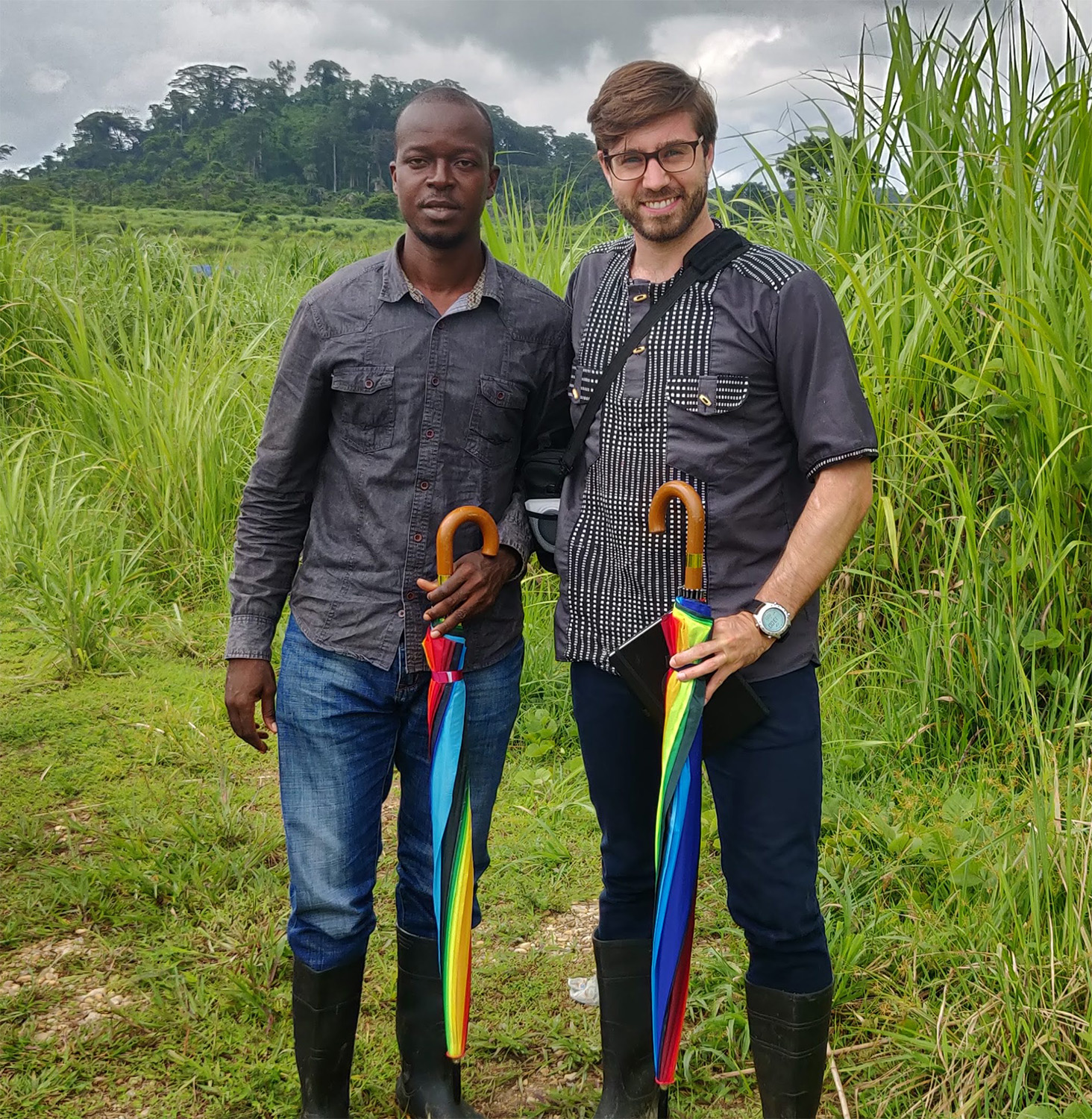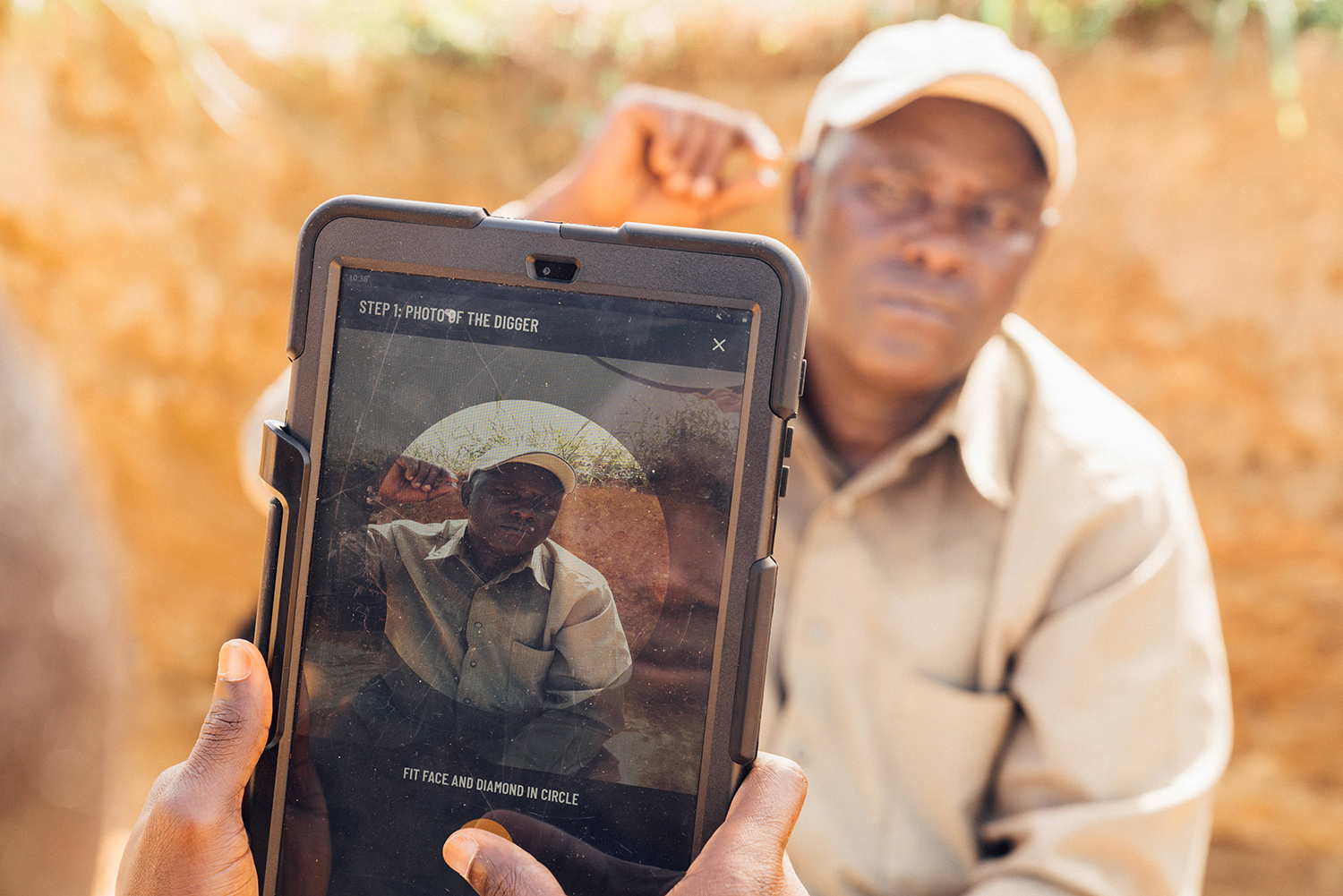AS THE COVID-19 CRISIS SPREADS THROUGH ASM AREAS,
INDUSTRY STEPPING UP TO HELP THE MOST VULNERABLE

A member of GemFair staff preparing food and aid packages for artisanal miners and their families at a mining site in Sierra Leone’s Kono region, as part of the organization’s COVID-19 response.
By Konstantin Born
Business Development Manager, GemFair
When I left Freetown, Sierra Leone, to fly home to my family in London on March 11, I expected to be back in West Africa within weeks. How could I have known that fewer than 10 days later the Government of Sierra Leone would announce the closure of all border crossings and international arrivals via air, and that I would be sitting in my living room in London while writing this piece. Even though it looks as if the first airlines will begin to resume flights to Freetown in the coming weeks, the country I have lived and worked in for many years will have changed markedly by the next time I return.
I am the Business Development Manager of GemFair, which was launched in 2018 by De Beers Group in Sierra Leone to advance the artisanal and small-scale diamond mining (ASM) sector. GemFair’s goal is to support the formalization of the ASM sector – by raising standards, delivering fair value and digitally tracing the diamonds that artisanal miners recover from the mine onward.
At the beginning of July, we announced together with the Deutsche Gesellschaft für Internationale Zusammenarbeit (GIZ) and the Mano River Union (MRU) that GemFair will be collaborating in the development and delivery of an ASM capacity-building program that promotes safe and responsible operating standards in the MRU member countries of Sierra Leone, Liberia, Guinea and Ivory Coast. It is part of a regional approach promoted by the Kimberley Process, of which the World Diamond Council is a supporter and stakeholder.

Before the COVID-19 crisis, the author, Konstantin Born (right), with Raymond Alpha, GemFair’s Location Manager in Kono, during a field trip in Sierra Leone.
Since GemFair’s inception, our teams in London and Sierra Leone have worked tirelessly to make a change for the most vulnerable and often forgotten members of our industry – the artisanal and small-scale diamond miners. Many people forget that the ASM sector is a significant employer in the global diamond sector, with millions more depending directly or indirectly on ASM for their livelihoods.
Having worked with artisanal miners both in a capacity as a policy advisor to Sierra Leone’s mining regulatory authority and during my time at GemFair, I will never stop to be impressed by how hard they work and how resourceful they are in order to generate an income for themselves, providing for the needs of their families and communities. And we have been making progress. Through the commitments and actions of the Kimberley Process Certification Scheme (KPCS) and more recently through initiatives like GemFair, we are starting to see the gradual but steady formalization of the sector.
However, like all sectors and the diamond industry more broadly, COVID-19 has had a devastating impact on the ASM sector. The economic, social and governance impacts of the pandemic will be felt in the diamond ASM sector long after the virus will have been brought under control.
As a result of the global disruption of supply chains, many artisanal miners have been unable to sell their diamonds. Added to that, with people and produce restricted from crossing district borders, food prices are rising rapidly, and many
Since the early stages of the pandemic, our team on the ground has been in constant contact with the 100 artisanal mine sites GemFair works with in the Kono region of Sierra Leone. Through these conversations, we have come to understand the impact that COVID-19 has had on their operations and livelihoods.
What we have learned is that that food supplies and items required for maintaining personal hygiene are currently the miners’ greatest need, with more than 95 percent saying specifically that the amount of food available to eat had decreased since the start of crisis.
We immediately set up a community response team that is now providing food and basic provisions to approximately 1,188 artisanal miners and their dependents in the areas that we are active. We also have provided a donation of crucial medical supplies to hospitals in the region, including gowns, masks and gloves.

During better days, a member of the GemFair field staff helping an artisanal miner to log a diamond onto the organization’s digital system.
Yet as important as this immediate assistance is, only a small percentage of artisanal diamond miners globally will receive humanitarian support through responses like GemFair’s. It is thus imperative for us as an industry to pull together and renew our commitment to finding solutions to help the diamond ASM sector rebuild stronger and more resilient after the crisis.
Apart from providing emergency aid, there are three crucial focus areas:
First, we as an industry must increase our efforts to build responsible and ethical routes to market for ASM in order to support the formalization of the sector.
Moreover, we must continue to improve on the carrying out and reporting on OECD-aligned supply-chain due diligence, ensure that the KP minimum requirements are upheld, and the WDC System of Warranties is complied with throughout the supply chain. Where feasible, we should also attempt to buy directly from legal entities in producer countries with responsible sourcing protocols, reinforcing formalization and formal, legitimate routes to market.
Second, miners need access to legitimate sources of financing to restart their operations.
The lack of access to legitimate and fair financing opportunities has always been one of the key issues that has held back the empowerment of ASM miners and communities. It is a situation that may force miners to turn to unfavourable sources in order to raise the funds necessary to begin mining operations, which in turn can lead to irresponsible practices. To break the cycle, new and innovative financing tools need to be developed for miners to obtain the capital they need to restart their operations and meet minimum responsible sourcing standards.
Third, the industry needs to support producer countries in raising standards in the ASM sector.
Here it is essential that we promote regional approaches within the KP, using these to build capacity, together with government, civil society and mine-level actors, providing guidance on how to implement the KPCS Minimum Requirements and the OECD Due Diligence Guidance.
The GemFair-GIZ-MRU agreement should be seen in this light. This program will enhance capacities, promote knowledge-sharing and build a comprehensive understanding of mine site health and safety, environmental management, ethical sourcing standards and diamond valuation among miners, government officials and civil-society activists. I strongly believe that this can act as model for other regions and it is imperative that we continue to support the creation of regional approaches with our technical experience and knowledge of the diamond value chain.
During these days of the COVID-19 crisis, more than ever, we must be ready to step up to the challenge of supporting the most vulnerable members of our industry.






